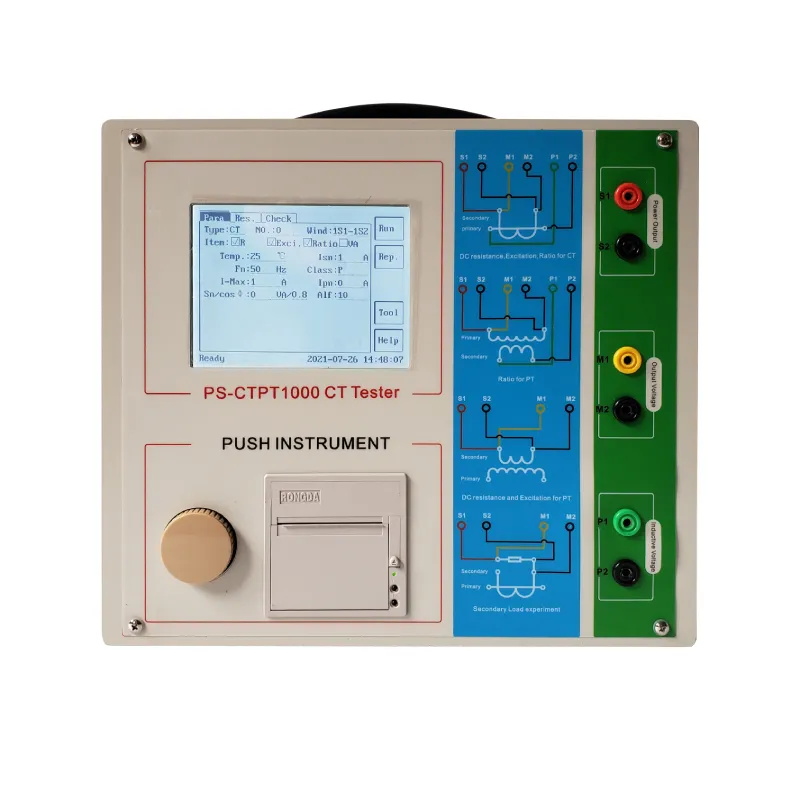 English
English


Electrical Circuit Breaker Testing Equipment and Procedures for Reliable Performance
Understanding Electrical Circuit Breaker Testers Importance and Functionality
In the realm of electrical engineering and maintenance, the reliability and efficiency of electrical systems are paramount. One of the critical components in ensuring safety is the circuit breaker, a device designed to protect electrical circuits from overloads and short circuits. To ensure these devices function correctly, electrical circuit breaker testers are invaluable tools used for testing and evaluating the performance of circuit breakers.
What is a Circuit Breaker?
A circuit breaker is an automatic switch designed to protect an electrical circuit from damage caused by overload or a short circuit. Unlike a fuse, which needs to be replaced after it blows, a circuit breaker can be reset manually or automatically to resume normal operation. The ability to interrupt the flow of electricity quickly is essential for preventing electrical fires and equipment damage.
The Role of Circuit Breaker Testers
Circuit breaker testers are specialized devices that assess the operational condition of circuit breakers. They perform a variety of tests to ensure that the breakers will trip appropriately under fault conditions, which is critical for the safety of both people and equipment. Testing these devices is crucial in various settings, including residential buildings, commercial establishments, and industrial facilities.
Types of Tests Conducted
1. Current Injection Tests This test involves injecting a predetermined current into the circuit breaker to simulate fault conditions. By measuring the time it takes for the breaker to trip under different current levels, technicians can evaluate the breaker’s responsiveness and operational limits.
2. Insulation Resistance Testing This test checks the integrity of the insulation surrounding the circuits. Insufficient insulation can lead to short circuits and electrical failures, making it essential to ensure that insulation resistance meets specified standards.
3. Contact Resistance Testing Over time, the contacts within a circuit breaker can corrode, leading to increased resistance and reduced performance. Testing the contact resistance can help identify potential issues before they lead to breaker failure.
electrical circuit breaker tester

4. Trip Timing Tests This evaluates how quickly the circuit breaker responds to an overload condition. Timely tripping is critical for minimizing damage to the electrical system and ensuring safety.
Features of Electrical Circuit Breaker Testers
Modern circuit breaker testers come equipped with advanced features that enhance their usability and effectiveness. Many models have intuitive interfaces that simplify the testing process, allowing technicians to quickly set parameters and interpret results. Some testers can store test data for later reference, enabling comprehensive analysis over time.
Moreover, portable circuit breaker testers are increasingly popular, allowing professionals to conduct tests on-site without the need for extensive equipment. This portability is particularly beneficial for field technicians who must assess multiple locations in a single day.
Importance of Regular Testing
Regular testing of circuit breakers is essential for maintaining electrical safety standards. Breakers can wear out due to age, electrical arcing, and environmental factors. Regular inspections and tests can help identify potential failure points, allowing for timely maintenance or replacement.
Additionally, many industries are subject to stringent safety regulations, making routine testing not only prudent but often legally required. By adhering to these guidelines, businesses can avoid costly downtime and ensure the safety of their employees and equipment.
Conclusion
In conclusion, electrical circuit breaker testers play a crucial role in ensuring the reliability of electrical systems. Through a variety of testing methods, these devices help detect potential failures before they lead to significant issues, safeguarding both human safety and equipment integrity. Investing in regular testing and maintenance not only complies with safety regulations but also contributes to the overall efficiency of electrical systems. As technology advances, circuit breaker testers are set to become even more sophisticated, providing critical insights into the operational readiness of one of the most vital components of electrical infrastructure.
-
Differences between open cup flash point tester and closed cup flash point testerNewsOct.31,2024
-
The Reliable Load Tap ChangerNewsOct.23,2024
-
The Essential Guide to Hipot TestersNewsOct.23,2024
-
The Digital Insulation TesterNewsOct.23,2024
-
The Best Earth Loop Impedance Tester for SaleNewsOct.23,2024
-
Tan Delta Tester--The Essential Tool for Electrical Insulation TestingNewsOct.23,2024





